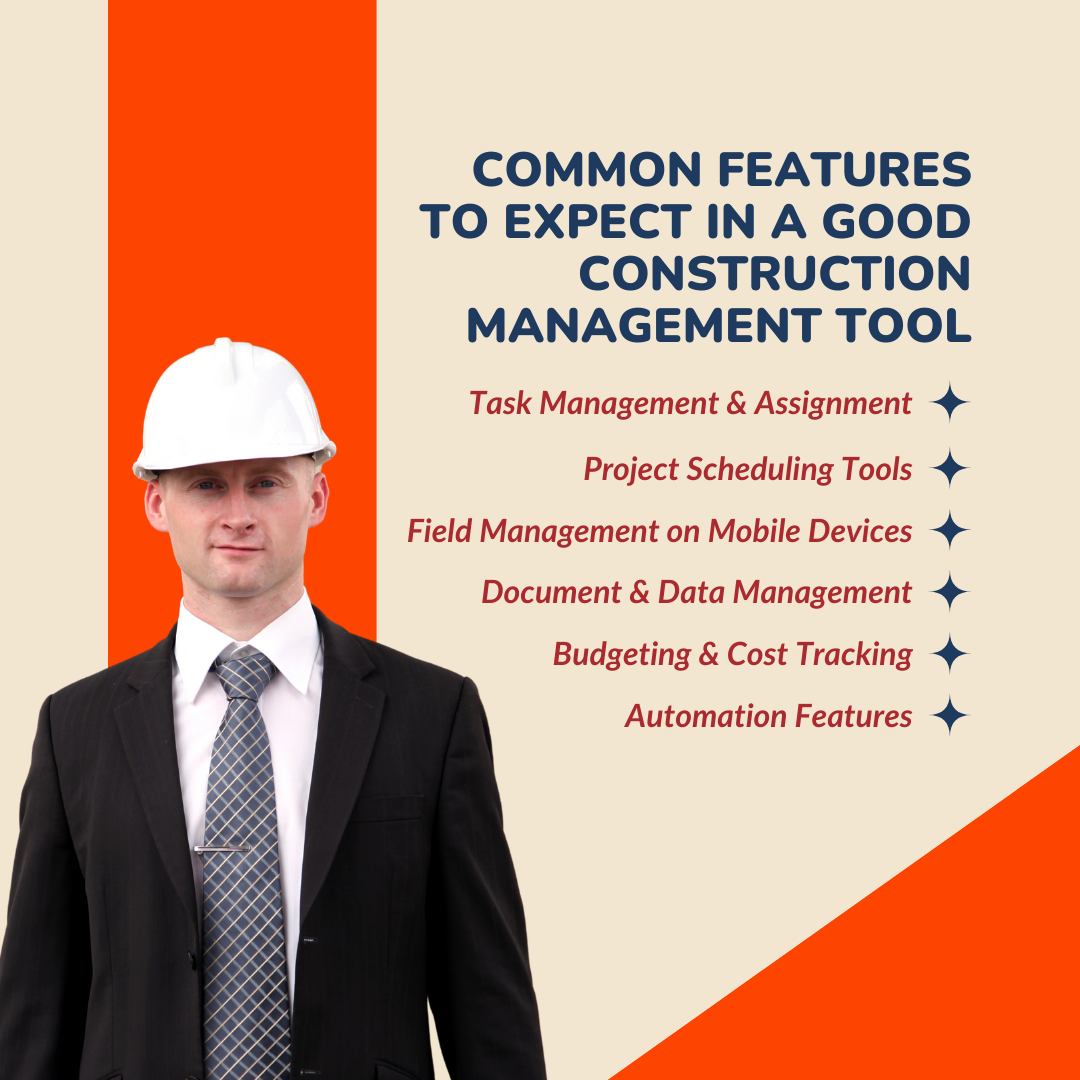Construction chaos? Maybe it’s not you, it’s your software.
In the construction industry, even the best-laid blueprints can get buried under miscommunication, outdated spreadsheets, or scattered data. If your construction projects constantly battle delays, cost overruns, or confused teams, it might be time to ask a serious question:
Is your current construction management software really pulling its weight?
This guide will help you cut through the noise, track progress, simplify the tech talk, and choose construction project management software that fits your goals, budget, team, tasks, and field needs, everything your firm needs to stay ahead.
Whether you’re a general contractor, project manager, or construction professional trying to stay ahead of the game, this is the checklist your firm has been waiting for.
Key Takeaways
- Learn what makes construction project management software effective.
- Understand key features like task management, field reporting, and project scheduling.
- Spot red flags that could cost you time, money, and sanity.
- Compare popular tools, including how Constructionbase stacks up.
- The top construction software platforms to explore in 2025.
- How to ensure your entire team stays organized and productive.
Why Construction Management Software Matters
Managing construction projects effectively is crucial to staying organized.
Without the right tools, it’s like building a skyscraper without scaffolding, technically possible, but painfully inefficient and dangerously chaotic.
Spreadsheets and sticky notes are not built to manage six-figure construction projects.
Construction management software brings structure to the madness by offering a centralized platform to manage tasks, budgets, timelines, documents, and communication.
Here’s how construction management software makes a difference:
- Streamlines project scheduling with calendar views and automation features.
- Improves collaboration among multiple teams and stakeholders.
- Simplifies document management, from blueprints to daily logs.
- Tracks financial data and cost codes to keep budgets in check.
- Keeps field management mobile, so updates from the construction site are real-time.
- Reduces manual entry, saving time and cutting down on errors.
In a nutshell, the best software helps you manage construction projects with clarity, speed, and confidence.
Have a look at: Revolutionize Your Projects with Construction Software
Common Features to Expect in a Good Construction Management Tool

Not all construction project management software is created equal. Flashy dashboards and sleek interfaces are nice, but real productivity comes from features that solve on-the-ground challenges.
Here are the key features you should expect:
1. Task Management and Assignment
Easily create tasks, assign them, and track who’s doing what. Say goodbye to Post-it note project plans.
2. Project Scheduling Tools
Calendar view, Gantt charts, and critical path tracking are essential for planning and hitting deadlines.
3. Field Management on Mobile Devices
Real-time updates, daily logs, and punch lists accessible on-site keep everyone aligned, even in the middle of the job.
4. Document and Data Management
Centralized storage for blueprints, invoices, and permits, with shared access for all stakeholders.
5. Budgeting and Cost Tracking
Stay ahead with tools that handle job costing, compare cost codes, and analyze actual performance vs cost estimates.
6. Automation Features
Let the system generate reminders, estimates, and streamline reporting with minimal manual input.
These features help manage tasks, track project progress, and streamline data for your construction teams.
Evaluation Criteria for Choosing the Right Software

Picking a management software that doesn’t fit your firm is like buying steel-toed boots two sizes too small.
Use these evaluation points to avoid painful missteps:
1. Team Size and Type of Projects
Are you managing large-scale infrastructure or mid-sized residential jobs? The best software adapts to your scale.
2. Field Usability
Can workers on the construction site access the platform on mobile devices?
Does it work offline and sync later?
3. Ease of Use
Complex software leads to poor adoption. Choose tools that your team can actually use without needing a tech degree.
4. Scalability
Will it grow with your business?
5. Data and Security Compliance
Ensure financial data and client documents are secure, backed up, and accessible.
6. Customer Support and Training
Does the vendor offer onboarding help, tutorials, and a responsive support team?
7. Integration with Other Tools
Your construction management software should play nicely with other systems you already use.
8. Pricing Transparency
Be wary of hidden fees or vague licensing structures. Ask for cost estimates for annual and multi-year plans.
Also Read: Ultimate Guide to Choosing the Best Construction Management Software
Red Flags to Watch Out For
Sometimes the software looks great on paper but performs poorly on-site.
Watch for these red flags:
1. Too Complex, Too Soon
If it takes longer to set up the software than to build a house, it’s a problem.
2. Lack of Automation
If it doesn’t support automated task management or project updates, you’re wasting hours every week.
3. Poor Reporting and Insights
You need clear views of financial data, timelines, and productivity. If reports are clunky or unclear, look elsewhere.
4. Hidden Costs
Look out for expensive add-ons, especially around document management and scheduling tools.
5. Limited User Access
If it doesn't support your entire team or restricts roles heavily, collaboration suffers.
Steps to Final Selection
Ready to make your move? Here’s a simple roadmap:
- Create a list of must-have features with input from your construction professionals.
- Research 5-6 top contenders (we’ll share a few next).
- Request demos and use trial versions to get hands-on experience.
- Ask real users, such as subcontractors, PMs, and field managers, for feedback.
- Score each platform on usability, project scheduling capabilities, and field management tools.
- Evaluate support and onboarding quality.
- Check for scalability and integration with other tools.
- Make your final selection based on performance, not price alone.
Must Read: Implementing Construction Management Software: Guide for Success
Top Construction Management Software (2025 Picks)

Here are some of the most trusted tools making waves in the construction industry:
1. Constructionbase
Platform: Modern, intuitive cloud-based platform built for real-world field challenges.
Target Market: SMBs to mid-large firms who want streamlined project management without enterprise-level complexity.
Core Strengths: Focused on simplicity + depth: task tracking, field updates, cost codes, calendar views, budget tools, and mobile reporting.
Key Features:
- Field reporting via mobile devices
- Task and crew assignment dashboards
- Budget forecasting and cost code tracking
- Calendar and Gantt-based scheduling
- Custom workflows and field-to-office communication
- Punch lists, daily reports, and job costing insights
- Real-time updates with cloud sync
- Support from construction-trained professionals
Complexity and Usability: Extremely user-friendly. Designed for quick onboarding, even for tech-averse field teams.
Integration and Customization: Easily integrates with accounting systems, Excel imports, and site tools. Custom dashboards and task flows.
2. Autodesk Construction Cloud
Platform: Cloud-based suite including BIM 360, Build, Takeoff, and Docs.
Target Market: Large-scale construction enterprises, engineering firms, and general contractors.
Core Strengths: Advanced document management, analytics, and project tracking. Excellent for design-to-build collaboration.
Key Features:
- Document versioning and control
- Construction analytics and dashboards
- RFI and submittal management
- Integration with BIM workflows
- Real-time collaboration and model coordination
Complexity and Usability: Powerful, but can be complex for smaller teams. Requires onboarding and training.
Integration and Customization: Seamless integration with AutoCAD, Revit, SharePoint, Smartsheet, and other Autodesk tools. APIs are available for custom workflows.
3. Procore
Platform: Full-featured cloud construction project management software.
Target Market: Mid-size to large construction firms, general contractors, and project owners.
Core Strengths: Stellar in field management, daily logs, RFIs, and financial tracking.
Key Features:
- Centralized communication and logs
- Budgeting and financial management
- RFI and change order tracking
- Mobile app for field teams
- Daily logs, photos, and punch lists
Complexity and Usability: User-friendly interface, mobile-ready, but may be overwhelming for very small teams.
Integration and Customization: Integrates with tools like QuickBooks, Microsoft Project, and dozens of others via Procore Marketplace.
4. Oracle Aconex
Platform: Enterprise-grade project control and collaboration software.
Target Market: Infrastructure megaprojects, multinational engineering firms, and public-private partnerships.
Core Strengths: Best-in-class for workflow management, document control, and handling stakeholder communication.
Key Features:
- Document control with audit trails
- Multi-party workflow automation
- Correspondence and approval routing
- Design collaboration across time zones
- Integration with scheduling and ERP tools
Complexity and Usability: Designed for large, complex projects. High learning curve but excellent scalability.
Integration and Customization: Integrates with Oracle Primavera, ERPs, and custom-built enterprise solutions.
5. Contractor Foreman
Platform: All-in-one construction management tool for small to mid-sized businesses.
Target Market: Contractors, small construction companies, subcontractors.
Core Strengths: Affordable and packed with features: scheduling, job costing, daily logs, estimates, and automation tools.
Key Features:
- Job costing and estimating tools
- Time tracking and payroll exports
- Scheduling and Gantt charts
- Daily logs and progress photos
- Custom form builder and checklist creator
Complexity and Usability: Easy to use, quick onboarding. Mobile-first with a clear dashboard UI.
Integration and Customization: Integrates with QuickBooks, Google Calendar, and more. Customization is limited but adequate for SMB needs.
Explore more about constructionbase today. Contact us to excel in your construction business!
Conclusion: Build Faster, Smarter, and With Less Stress
Selecting the best construction management software isn’t just a tech decision; it’s a business-critical one.
The right platform will help you manage construction projects with less chaos, more control, and better results overall.
It’s time to switch spreadsheets, endless email chains, and disconnected tools. With the right construction software, you’ll bring your entire team together, from field crews to the office, under one digital roof.
FAQs
1. What is construction management software?
It’s a platform that helps contractors, project managers, and teams manage construction projects from start to finish, including scheduling, budgeting, and field updates.
2. How does project management software help in construction?
It centralizes project updates, reduces delays, improves communication, and helps manage financial aspects like cost estimates and job costing.
3. How do I know if my team needs new construction software?
If you're still using spreadsheets, missing deadlines, or juggling too many tools, it's time to upgrade.
4. Can I integrate construction software with other systems I use?
Yes, most platforms integrate with clients' accounting, CRM, and scheduling tools to streamline your business workflows.
Have questions or need personalized advice?
Talk to an Expert Today and let our construction specialists guide you to success.







